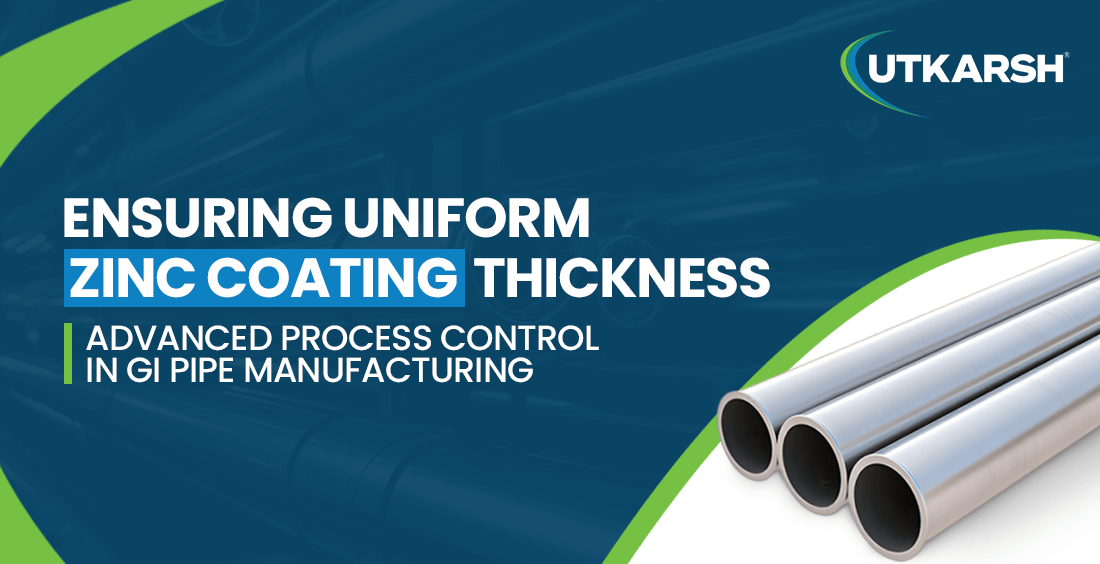Ensuring Uniform Zinc Coating Thickness: Advanced Process Control in GI Pipe Manufacturing

In the infrastructure and fluid transport industry competes on a daily basis, GI pipe manufacturers have to come up with new designs and products that are more durable, reliable, and resistant to corrosion. One distinguishing characteristic of high-grade GI pipes is the consistency of the zinc coating. In difficult environments, this inconspicuous quality is crucial for maintaining pipe integrity and preventing corrosion.
Join us in exploring the intricacies of achieving uniform zinc coating and its significance in the GI pipe manufacturing process.
Why Uniform Zinc Coating Matters
A consistent zinc coating ensures uniform protection of the pipe surface, averting preemptive corrosion in certain areas. Uniformity in the pipe surface is critical; without a protective layer some regions will be exposed, making the entire structure unsafe and reducing its lifespan and safety. For GI pipe manufacturers, achieving this uniformity is a key priority during the manufacturing process of GI pipes.
The GI Pipe Manufacturing Process: A Closer Look
1. Selection and Prep of Materials
It all begins with the selection of steel as it is the primary constituent of all GI pipes. Before undergoing galvanization, the pipes are put through a thorough cleansing by way of pickling, which eliminates rust, scale, or oil. This stage is very important as all surface impurities could disrupt the evenness of the zinc layer, which will be applied later.
2. Hot-Dipped Galvanizing
At this point, the addition of zinc coating takes place. The pipes are placed in a casing filled with molten zinc for dipping at roughly 450°C. The advanced temperature individuals have controls and dwell-time monitoring systems that guarantee coating on all the parts of the pipe is even. This is where the main action of the GI pipe manufacturing process takes place.
Delay-tolerant algorithms control the immersion time at the set temperature for the sensors placed around the pipe in real time. Any non-steady state condition which causes uneven coating build-up or gaps is dealt with in seconds and therefore voided.
3. Air Wiping and Thickness Control
Once the pipes have been dipped in zinc, they are placed in front of air knives, which are high-pressure jets that eliminate excess zinc and aid in achieving evenness. At this point control over achieved thickness is very critical. Moreover, there are other tools used by GI pipe manufacturers which make it possible for them to measure the evenness of the zinc layer without any delay.
4. Post-Coating Inspection and Testing
Each batch undergoes a series of inspections, including coating thickness tests, adhesion tests, and visual inspections. Only pipes that meet stringent quality parameters are cleared for the next stage. Advanced process control software keeps records for traceability and quality assurance throughout the manufacturing process of GI pipes.
Automation & Innovation in Coating Control
With growing demand for high-quality piping in construction, agriculture, and industry, GI pipe manufacturers are adopting more automated systems for real-time quality control. Smart sensors, automated coating thickness measurement tools, and predictive analytics help manufacturers maintain consistency and reduce wastage.
Leading the Way: Utkarsh India
Among the top GI pipe manufacturers in India, Utkarsh India stands out for its focus on precision and durability. As a trusted GI Pipe supplier, Utkarsh offers pipes that conform to IS 4736 standards. Their pipes feature tensile strength ranging from 240 MPa to 350 MPa and yield strength up to 150 MPa.
Manufactured using the hot-dip galvanising process and superior raw materials, Utkarsh GI pipes are built to last. Whether it's for irrigation, potable water, infrastructure, or industrial fluid transport, these pipes offer unmatched reliability and versatility.
Conclusion
Uniform zinc coating isn’t a luxury – it’s a necessity for long-lasting performance. Thanks to advancements in technology and strict process control, GI pipe manufacturers today can ensure consistent quality across every pipe they produce. From the raw material stage to final inspection, each step in the GI pipe manufacturing process plays a role in delivering pipes that can truly withstand the test of time. Whether you're sourcing for a residential, commercial, or industrial project, trusting a reliable GI Pipe supplier like Utkarsh India can make all the difference.